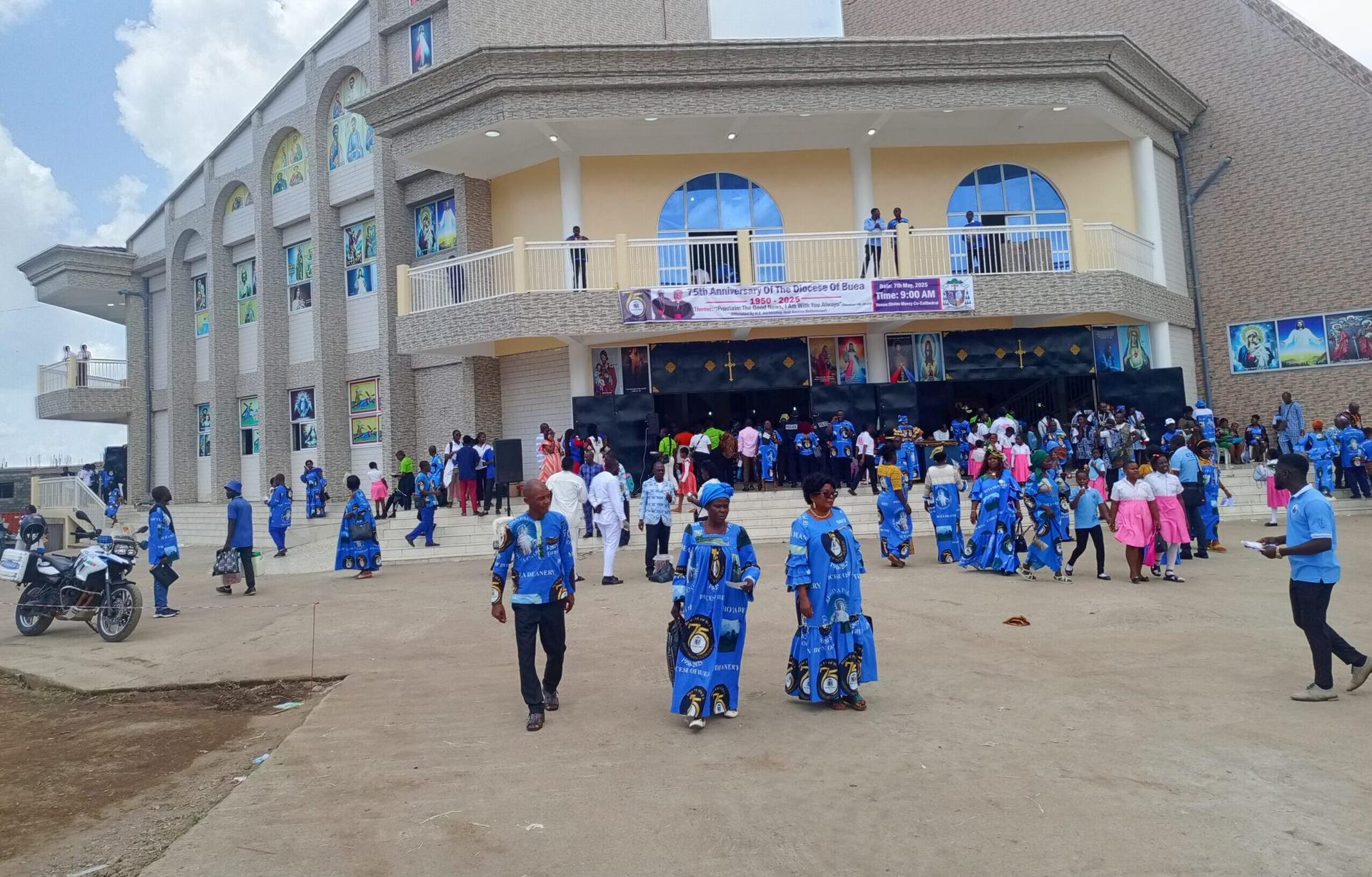BUEA, Cameroon – Seventy-five years ago, the Diocese of Buea was established in Cameroon’s South West region, marking a historic milestone as the country’s first diocese.
Now, seven decades later, thousands of Christians gathered at the Divine Mercy Co-Cathedral in Buea on May 7 to celebrate this enduring legacy of faith.
“The faith that has been passed down to the people, nurtured within communities, and continues to sustain us is what we celebrate today,” said Bishop Michael Miabesue Bibi of the Buea Diocese.
However, the history of the diocese story stretches even further back. It was part of the Apostolic Prefecture of Cameroon in 1890, became an Apostolic Prefecture in 1923, and was later designated an Apostolic Vicariate in 1939. On April 18, 1950, it officially became Cameroon’s first diocese.
Successive bishops played a crucial role in its growth, founding religious congregations and establishing new parishes.
In 2019, Michael Bibi was appointed Bishop of Buea, and in 2021, and officially became its 5th residential bishop. Today, the Diocese of Buea continues to flourish, with 37 parishes serving its community.
Archbishop Andrew Nkea Fuanya, President of the Cameroon Bishops’ Conference, described the diocese as “the mother” of Cameroon’s 26 Catholic dioceses.
Like all the Church in Cameroon, the Diocese of Buea has endured a turbulent history — surviving the hardships of two world wars, the struggle for independence, and, today, the ongoing separatist crisis affecting the country’s English-speaking North West and South West regions.
Throughout the celebration, speakers subtly referenced the current crisis as they reflected on years of unwavering faith.
Nkea urged Church leaders in Buea to “continue to give hope to the hopeless, especially in this time in the history of our country.”
While the archbishop did not explicitly define “this time in the history of our country,” anyone familiar with Cameroon’s challenges would recognize his reference to the ongoing separatist crisis in the country’s two English-speaking regions.
Since 2016, these regions have been embroiled in a separatist war, fueled by long-standing grievances over the marginalization of Anglophones by the Francophone-dominated government.
The crisis reached a boiling point eight years ago when teachers and lawyers in the two English-speaking regions took to the streets, protesting what they saw as the imposition of French in Anglo-Saxon schools and courts.
The government’s military crackdown on these peaceful protests only escalated tensions. In response, a separatist movement emerged, demanding secession and the creation of a new nation called Ambazonia.
Since then, the conflict has taken a devastating toll — at least 6,500 people have lost their lives, and over a million more have been displaced.
While the crisis was not directly addressed during the 75th anniversary of the Diocese of Buea, its effects were undeniable. In an interview with Crux, Grace Ngong, a catechist at Bojungo — Cameroon’s oldest parish — acknowledged the deep impact of the conflict on the church.
Ngong fled to the South West region when violence intensified in her hometown of Wumin the North West region, where she had also been serving as a catechist.
“When I arrived in Bojungo, I continued my work as a catechist,” she told Crux.
“I have been serving there for six years,” she added, though she declined to comment further on the ongoing crisis.
Felicia Motia, a programs analyst at Carita Buea was more forthcoming.
“Seeing the entire Christian community of the Diocese of Buea, along with other guests, come together to celebrate the 75th anniversary is truly significant to me. This feeling is even stronger when I consider the ongoing Anglophone crisis affecting the region, particularly in the Southwest, where the diocese is located. Given these challenges, the church’s efforts — especially in my own department — have been crucial in providing support to vulnerable people,” she told Crux.
“It is truly meaningful that Caritas, the charitable arm of the church, is working closely with the church to support vulnerable people in various ways—through education, emergency assistance, and more,” Motia said.
Acknowledging the ongoing crisis and the internal struggles within the Church, the Apostolic Nuncio to Cameroon and Equatorial Guinea, Archbishop José Avelino Bettencourt, called for unity, urging the people of God to stand together and work in harmony with their Bishop.
“Unity is important,” Bettencourt said. He used the metaphor of a rope to illustrate the strength and importance of unity.
“Consider a single thread — fragile, easily broken with the slightest pressure. Snap! It is gone. But a rope is different. A rope is made of many weak threads woven together into a strong, unbreakable bond. That is unity,” he said.
“Similarly, unity binds people together, making them stronger, more resilient, and able to withstand challenges. Just like the intertwined threads of a rope create durability, individuals united in faith, purpose, or community form a powerful force,” Bettencourt told Crux.
“Your unity to your bishop guarantees the universal church’s support for you,” he added.
He talked up the 75th anniversary celebrations, noting that “the faith of the Catholic Church was kept alive thanks to your parents and your grandparents and to the tribes, which kept the faith alive, even when priests were not allowed to minister. So today is a celebration of faith.”
Bibi noted that the celebration should not blind the Christian community to the various challenges it still faces and announced that a diocesan synod will be convened in the near future to assess what has been done and what remains to be done.
“Together with members of Christ’s lay faithful, the religious, the priests, and myself, we are going to sit and have an evaluation of the state of the diocese. Of course, there are things that exist in the diocese that are good, that we have to maintain. There are also certain things that we may need to take some decisions on, and get proposals on how we can live, and live better, in a united way, in communion with one another,” the bishop told Crux.













